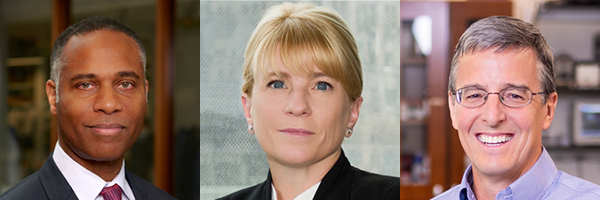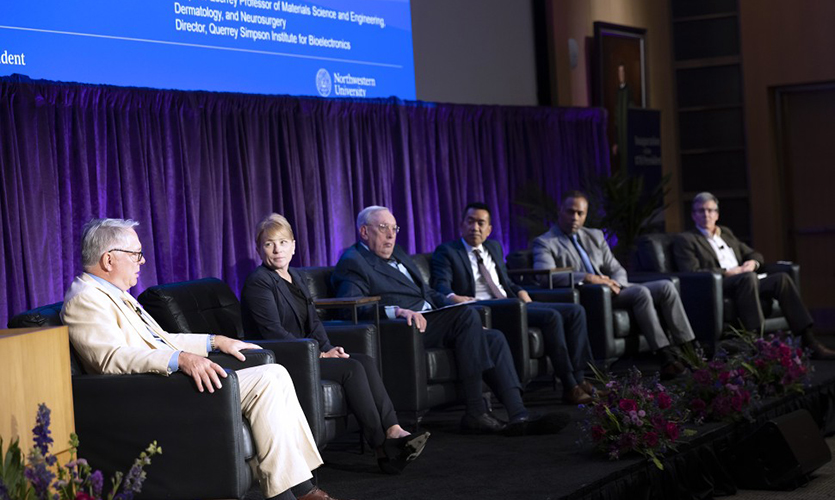What Does the New Frontier in Biomedicine Look Like?
As part of inauguration week, an expert panel including McCormick faculty explored hot topics in medicine
Some of Northwestern University’s brightest minds in biomedical science converged before a packed auditorium to discuss the hottest topics in their fields.
Hosted by Provost Kathleen Hagerty, “The New Frontiers of Biomedical Science and Biomedical Engineering” explored wide-ranging matters related to improving the quality of human life, including advances in artificial intelligence (AI), new approaches to treating cancer, the quest for longevity, the potential of regenerative medicine, and the promise of bioelectronics.

The May 30 event — which took place at Hughes Auditorium on the Chicago campus — was one of two academic panels organized to discuss contemporary topics of importance of higher education as the University gears up for the inauguration of President Michael H. Schill.
Panelists from Northwestern Engineering included Professors Guillermo Ameer, Shana Kelley, and John Rogers.
“We’ve been thinking about this symposium for a while and what constitutes a ‘new frontier’ in biomedical science or biomedical engineering,” said Eric G. Neilson, vice president for medical affairs and Lewis Landsberg Dean of Northwestern University Feinberg School of Medicine, who moderated the event. “We thought the best way to talk about this was to identify scientists from Feinberg, McCormick, and Weinberg College to talk about the research areas they have been attracted to and have an informal discussion about hot topics in those areas.”
The secrets of aging
To kick off the panel, Neilson asked Douglas Vaughan about aging and how far researchers can push human life expectancy.
“We’re at a unique point of human history where we have a fundamental understanding of the biology of aging as well as an ability to precisely measure biological age,” said Vaughan, the Irving S. Cutter Professor and chair of the department of medicine at Feinberg, director of the Potocsnak Longevity Institute, and physician in chief at Northwestern Memorial Hospital. “Together, those give us an opportunity to potentially unravel this mystery that’s intrigued the human species since the beginning of our time on this planet.”

Vaughan said that advancements in science have opened the possibility to “alter the pace of aging” in humans. Although genetics play an important role, epigenetics are an even more important factor in determining the speed of aging. The environment a person lives in, food they eat and surrounding societal stresses all affect lifespan.
Eradicating tumors with blood cells
Kelley discussed the launch of the CZ Biohub Chicago as well as her work to use engineering-driven approaches to understand diseases, such as cancer. In recent studies, Kelley and her team pinpointed immune cells in blood that can recognize and destroy cancer cells. In an animal study, Kelley and her team leveraged these cells to completely eradicate solid tumors.
“Our immune cells are constantly surveying the body, trying to figure out if there’s a disease or a cell that’s turned cancerous,” said Kelley, the Neena B. Schwartz Professor of Chemistry and Biomedical Engineering at the Weinberg College of Arts and Sciences and McCormick, professor of biochemistry and molecular genetics at Feinberg, and president of the Chan Zuckerberg Biohub Chicago. “We know that immune cells eventually infiltrate into tumors to do hand-to-hand combat in there to get rid of tumor cells. But it had not been discovered previously that you can actually find these cells in the blood.”
AI-driven precision medicine
Research generates new data constantly, but are we making the most of it? Abel Kho and his team combine research data in novel ways and then leverages AI to mine big data to identify new methods for treating diseases, estimate population-level disease burden and perform high-throughput phenotyping. His team also explores ways to “responsibly apply” large language models to research challenges while avoiding bias or discrimination.
“If you can mine multiple sources of data, you can find phenotypes of diseases — more specific types of disease — that might be more relevant for the person sitting in front of you,” said Kho, professor of medicine and preventive medicine at Feinberg, director of the Center for Health Information Partnership, and director of the Institute for Augmented Intelligence in Medicine. “Then you can precisely target therapeutics that would affect that person in front of you.”
Engineering solutions for healing
The field of engineering might not seem compatible with life and medicine, Ameer said, but engineers are helping turn regenerative medicine “into a reality.” Ameer discussed his group’s advances in regenerative engineering and how new smart regenerative systems can improve outcomes of surgery.
“Historically, regenerative medicine relied on biology or biochemistry — the life sciences side of wisdom or knowledge,” said Ameer, the Daniel Hale Williams Professor of Biomedical Engineering at the McCormick School of Engineering, professor of surgery at Feinberg, and founding director of the Center for Advanced Regenerative Engineering. “Within the past two decades, we saw engineers step in and demonstrate that, by bringing disparate fields into the picture, we can significantly improve the chances of making these therapies a reality.”
Electrical insights
To close the panel, Rogers showed multiple wireless, wearable, biocompatible devices that his team has developed in the laboratory to continuously monitor health. Among his many inventions, he showed a temporary tattoo-like device that sits on the skin to track biochemistry in sweat and a postage-stamp-sized device that softly adheres to the throat to collect the body’s vital signs.
We need the best and the brightest, from whatever background they might be.
“Our goal is to develop new platforms that can be used to develop new insights into fundamental processes in biological systems as research tools but ultimately as new platforms for clinical medicine and patient care,” said Rogers, the Louis Simpson and Kimberly Querrey Professor of Materials Science and Engineering, Biomedical Engineering, and Neurological Surgery at McCormick and Feinberg, and the director of the Querrey Simpson Institute for Bioelectronics. “We want to improve outcomes and reduce cost.”
All of the panelists agreed on the importance of collaborating with researchers outside their own fields, integrating disciplines, and encouraging more diversity in the sciences.
“We talk a lot about diversity, equity, and inclusion,” Ameer said. “I think it’s a necessity. We’re doing this out of need — not because it’s the right thing to do. We need the best and the brightest, from whatever background they might be.”